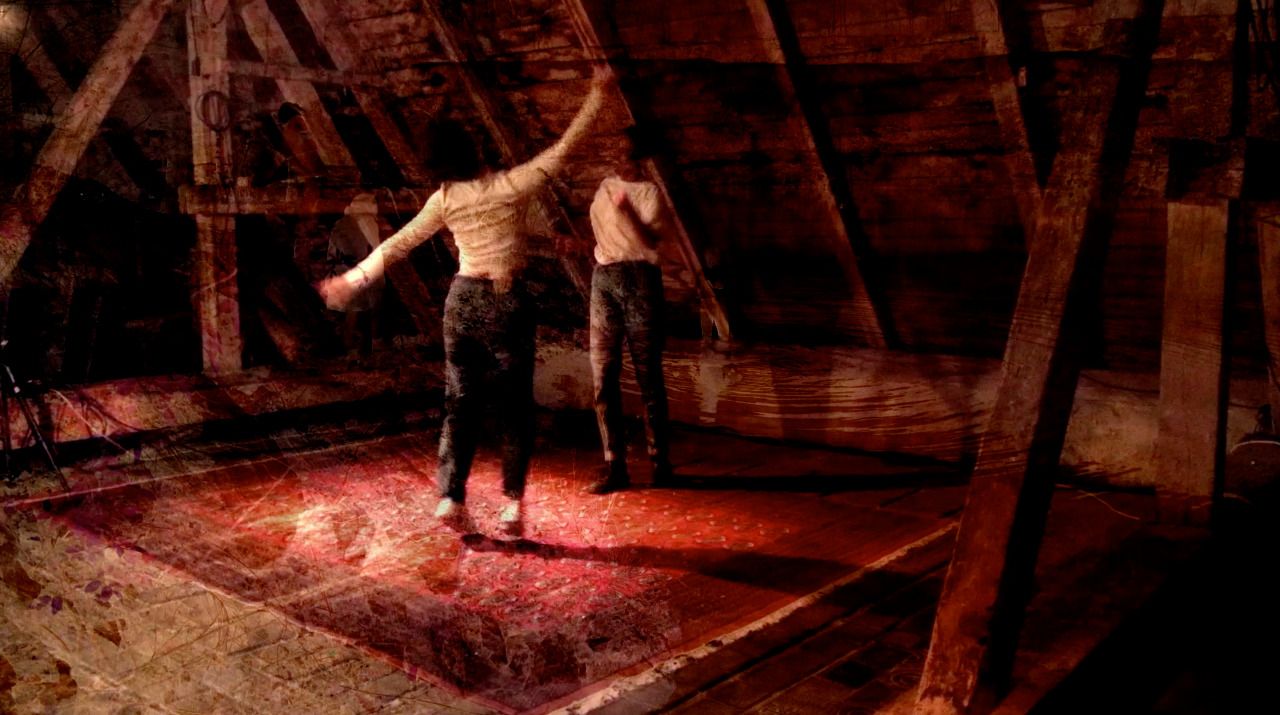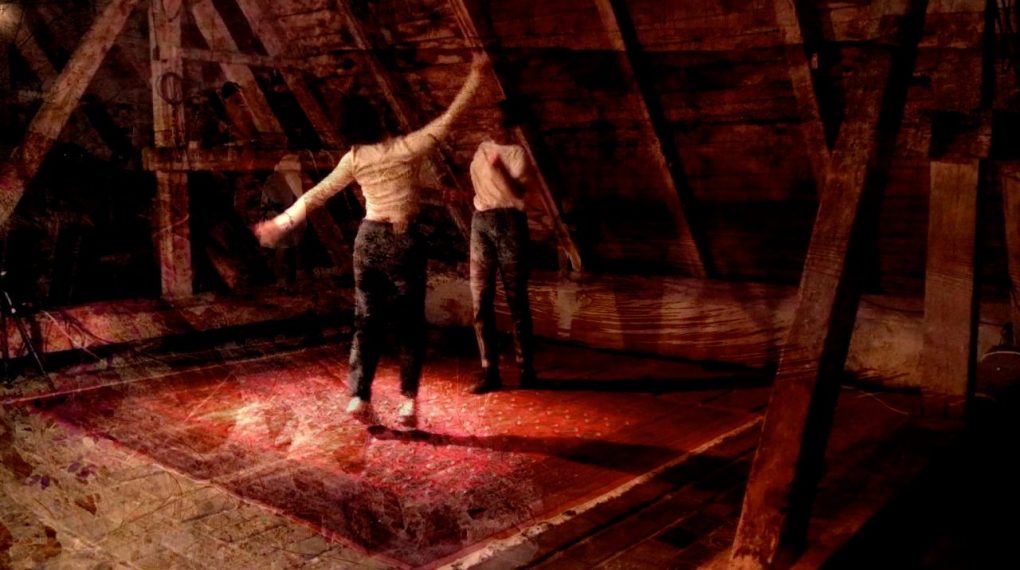Film in tschechischer Sprache mit englischer Übersetzung
[Das Streaming Angebot der TanzTage ist frei zugänglich. Ihr könnt frei wählen, ob und in welcher Höhe ihr unser Festival mit einer Spende unterstützen möchtet! / The TanzTage streams are freely accessible. You are free to choose whether and how much you would like to support our festival with a donation!]
Empfohlene Spende / Suggested Donation: Supporter: 15€ / Normal: 10€ / Ermäßigt/Reduced: 8.00€
STREAM LINK / DONATE
Laments for love they’ve not known (yet)/Lamenty pro lásku jakou nepoznaly*i
by Zeynab Gueye & Tereza Silon (CZ), 2020
BLOG: laments4love
[DE]
Zeynab Gueye und Tereza Silon schaffen Räume und Interaktionen, in denen die Liebe zwischen dem Persönlichen und dem Planetarischen/Kollektiven hin und her fließt. Manchmal verstärken sich diese Positionen gegenseitig, manchmal stehen sie in einer komplexen Beziehung. Klagelieder sind Rituale für die Liebe, die wir uns wünschen, die aber in ihrer möglichen Existenz in den aktuellen Systemen unsicher bleiben. Der Blick auf die Utopie lässt uns um die Zeiten trauern, in denen wir nicht wussten, wie es sein würde, mehr zu wollen und auf würdigere und angenehmere Weise in Beziehung zu treten. Wir trauern um die Zeiten, in denen unsere Wünsche Angst hatten, ihre Stimme zu erheben. Klage ist ein Ritual der Reinigung – die darauf folgende Leere/Freigabe kann eine Möglichkeit sein, die (un)möglichen Körper, sozialen/ökologischen Konstellationen, queeren Sensibilitäten und Wünsche zu imaginieren und zu träumen, die sonst unter den Sedimenten verhärteter Trauer verbleiben würden. Klage ist ein Ritual, in dem der Körper sich öffnet, sich ergießt, in Resonanz geht und diejenigen kanalisiert, von denen wir wissen; diejenigen, die vor uns hier waren und die noch kommen werden. Die Praxis des Klagens ist sowohl uralt als auch futuristisch. Die Praxis des Klagens ist erotisch. Die Praxis des Klagens ist Dissens in einer Kultur der Stumpfheit. Eros und Trauer nicht mehr zu trennen, nicht mehr depressiv, sondern akut lebendig zu sein, und sich dennoch des Sterbens und unserer Kultur der Entehrung von Leben/Tod bewusst zu sein, nimmt den Mächten des Marktes den Wind aus den Segeln. Dich lebendig fühlen zu wollen, ist ein Schwur meiner Liebe zu Dir.
[CZ ]
Zeynab Gueye a Tereza Silon zvou do sonického, diskursivního a pohybového prostoru, ve kterém se láska pohybuje mezi osobní a planetární/kolektivní úrovní, které se někdy vzájemně amplifikují a jindy jsou v komplexním vztahu. Rituály lamentu pro lásku, jakou si pro sebe i druhé přejeme, ale nejsme si jisty*i, že je v současném systému možná. Záblesky utopie v nás vyvolávají truchlení pro časy, které jsme promrhaly*i bez povědomí o tom, že můžeme chtít více a vztahovat se spravedlivěji; časy, v kterých se naše touhy bály mluvit vlastním hlasem a pro časy, ve kterých zase naše budou utichat. Lament je rituál očisty a prázdno/uvolnění jež po něm vzniká, může být prostorem pro snění těl, společenských/ekologických konstelací a queer senzibilit a touhy, které by jinak byly nemožné. Lament není vždy ladný a podobně jako fyzický proces zármutku předefinovává a transformuje, kým jsme byly*i a kým už nejsme, kým se toužíme stát, nechává nás i diváka sedět s harmonií i disharmonií patřící k tomuto procesu. Médium, kterým předáváme tento obsah, jsou naše těla a jejich hlasy, které z různých důvodů a intersekcí nezabírají ve veřejném prostoru tolik místa, abychom mohly*i amplifikovat naše osobní příběhy a aby docházelo k zesílení specifických intersekcí pozic, ze kterých mluvíme my nebo ostatní. Někdy ztrácíme slova, někde jsou prožitky moc staré na to, aby byly vyjádřeny pouze slovy. Rituál lamentu je rituál, v němž se tělo otevře a teče a zní a chanelluje ty, které známe, ty, co zde byly*i před námi a ty, co přijdou. Praxe lamentu je ancestrální i futuristická a zahrnuje širší ekologie skrze náš vtělený zážitek. Praxe lamentu je erotická. Praxe lamentu je disent v kultuře otupělosti. Cítit se naživu je náš příslib lásky pro sebe, pro ostatní.
[EN]
Zeynab Gueye and Tereza Silon create space and interactions in which love flows back and forth between the personal and the planetary/collective. Sometimes, these positions strengthen each other, sometimes they are in a complex relationship. Laments are rituals for the love that we wish for but remain unsure about possibilities of its existence in the current systems. Glimpses of utopia make us mourn for the times which we had not known how it would be to want more and relate in more dignified and pleasurable ways. We mourn the times when our desires were afraid to speak through their voices. Lament is a ritual of ablution – the void/release which follows can be a possibility for imagining and dreaming the (im)possible bodies, social/ecological constellations, queer sensibilities and desires which would otherwise remain under sediments of hardened grief. Lament is a ritual in which the body opens, pours, resonates and channels the ones that we know of, the ones that have been here before us and the ones yet to come. The praxis of lament is both ancestral and futuristic. The praxis of lament is erotic. The praxis of lament is dissent in a culture of dullness. To no longer separate eros and grief, to not be depressed but acutely alive, and yet aware of the dying and our culture of dishonouring life/death takes the wind from the sales of the Empire. Wanting to feel you alive is a vow of my love for you.
Tereza Silon’s interdisciplinary practice stir on the confines of performance, healing technologies, facilitation and research. She combines the theoretical and the political with embodied explorations. Her interest lies within the social and natural ecologies, individual and collective bodies, intersectionality, queering, the erotic and possibilities of expansive intimacy in extractive systems as a subversion/healing of power structures. Her theoretical rudiments have also risen from her studies of rituals and ephemeral art forms, studies of clinical naturopathy and bodywork practice.
Zeynab Gueye is an interdisciplinary artist, researcher, community organizer, an initiator of a digital queer-feminist platform and a DJ. Their practice is influenced by their love for pro-Black queerness, intersectional feminism and by their interest in ecologies and the abilities to dream of visionary futurisms amidst social depression. Their academic experience is influenced by the study of reflexive anthropologies and postcolonial theories. They perceive individual contextualized embodied experience as a source of valid knowledge.



